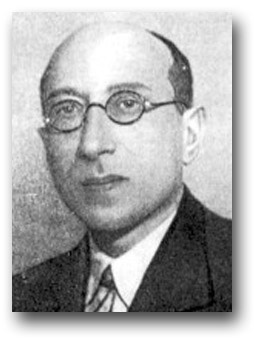
Aron Gurshtein
Aaron Gurshtein was born in 1895 in the town of Krolevets, Ukraine. Because his father Sheftel worked as a clerk for a transport company, the family had to change its place of residence many times. In 1913, Aaron published his first poem in Yiddish. In 1916, after graduating from a Yiddish gymnasium in Vilna, he enrolled at the University of Petrograd, where he studied Hebrew literature.
After his graduating from the University in 1920, Gurshtein attempted to enlist in the Red Army but was rejected as a foot soldier because of his myopia. He then worked as an editor of the "Volunteer's Sheets," a newspaper of the 6th Army. In 1921, he was demobilized and settled in Moscow, where he began studying in the Faculty of Oriental Languages of Moscow State University. At that time Gurshtein began to publish his first works in the fields of history and criticism of literature. In 1924, he published a major study about Yitskhok Leybush Peretz. In 1926, Gurshtein began teaching at the Second Moscow State University, and in the late 1920s, he became a docent (assistant professor) in the department of Yiddish literature of this university. In the 1930s, he became a professor of Yiddish literature at the Universities of Kiev and Odessa. His field was criticism of Yiddish and contemporary Russian literature. In 1935- and 1936 he worked in the literary criticism and bibliography department of the main Soviet newspaper Pravda.
On July 6, 1941, i.e. two weeks after the attack of Nazi Germany against the Soviet Union, Gurshtein volunteered for the Home Guard of Moscow. He was enrolled in the so-called "Writers' Company" (the 3rd company of the 1st battalion of the 22nd Infantry Regiment). Among the members of this battalion and of the 2nd battalion the writers as Emmanuil Kazakevich, Ruvim Fraierman, Aron Kushnirov, and others). Gurshtein's friend Sergei Dziubinskii described him as a quiet, unbelligerent person, who was bald and physically weak. He was also so shortsighted that he could hardly aim a rifle. However, this small man was outstanding in his fortitude and endurance. This was clear by the way he marched together with the rest of the "writers" without complaining.
From July to September 1941 the "writers' company" was engaged in fortification works, including digging trenches. Toward the end of this period, Gurshtein was appointed company clerk. However, in October 1941, the situation changed abruptly: the battle of Moscow began, and the Home Guard was thrown into the thick of combat. Gurshtein was killed in one of the first engagements. According to an apparently reliable account, he was killed by a bullet while dragging an ammunition box to his unit's position. According to more doubtful reports, he either was captured by the Germans or joined Soviet partisans after his platoon was shattered. His friend Dziubinskii was not aware of the details of his death.
Gurshtein's close friend and frontline comrade Sergei Dziubinskii related conversation he had once with Gurshtein:
"– 'Would you like to go to your family now?' – I asked him in a low voice. He did not answer immediately […]
– 'I love my family very much…' – he said thoughtfully. – 'I have a wife in Moscow who is a wonderful friend, and a son. In all other circumstances, I would never part with them. But war, you understand, especially this war…
Gurshtein turned to me and spoke with a vehemence that was unusual for him.
– 'Can you understand me when I say that this war has reminded me not only of my civil duty, but also of my ethnic duty? Because I am a Jew, and this war imposed on us by the fascists has made me feel with special force that I am Jewish. During peacetime, I felt equal to a Russian, or to a Georgian, or to an Uzbek. The Soviet regime has instilled in me the belief that I am not simply a Jew. I am a Soviet Jew, a Soviet citizen […] And now, all of a sudden, a deadly danger threatens my Motherland and me personally. Fascism means death to all kinds of culture, and for me, as a Jew, it means complete death, both spiritually and physically. Fascism wants to annihilate me and my brothers, my people, from the face of the earth. And I am resisting, I have to resist […] That is why the German fascist is our common enemy – yours and mine, but besides that, he is my personal enemy. I want, I have to, fight him – with all my knowledge and all my might."
From: GARF 8114-1-115, pp. 225-238, copy YVA JM/26121
A brief sketch on Gurshtein in the YIVO Encyclopedia of Jews in Eastern Europe:
"Immediately after the German attack on the Soviet Union, Gurshteyn enlisted in the Soviet Army and was killed in action in the fall of 1941. Officially venerated as a war hero rather than deplored as a “bourgeois nationalist” or “rootless cosmopolitan,” [in the Stalinist anti-Jewish campaign of 1948–1953], he remained a respected but somewhat obsolete figure in the Soviet literary canon. A collection of his Russian essays published posthumously in 1959 became one of the first publications after the persecutions of 1948–1953."
From: "Gurshteyn, Aron", in: YIVO Encyclopedia of Jews in Eastern Europe, ed. Gershon D. Hundert, New Haven: Yale University Press, 2008; vol. 1, p. 642






